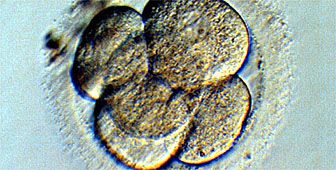Swiss ambivalent about stem cell research

The Swiss have mixed feelings about embryonic stem cell research, according to a survey by the Swiss Centre for Technology Assessment (CTA).
Stem cell technology has been touted by many scientists as the way of finding cures to many diseases, especially degenerative ones such as Parkinson’s or Alzheimer’s. Researcher hope to modify stem cells, which don’t have a defined role, into specialised cells that could replace damaged ones
But while the scientific and medical perspectives are mouth-watering, the public has misgivings about the techniques used. According the CTA, this is because the stem cells have to be taken from surplus human embryos.
“People are ambivalent about this because on one side, the research is intended to save or improve lives, but on the other, the use of embryonic stem cells is considered by many to be an attack against life itself,” said Danielle Bütschi, leader of the CTA’s Publifocus project.
The CTA survey used six focus groups – one in each of the country’s three main linguistic regions, as well as one each for women, religious representatives and patients.
Stem cell suspicions
Despite the diversity of outlooks, only one common idea shone through: the public has mixed feelings about stem cell research.
“People are reasonable and say yes when they realise what the potential benefits are,” said Sergio Bellucci, the head of the CTA. “But in their hearts, they would rather say no.”
People are also pragmatic because they realise that surplus embryos would be otherwise destroyed as Swiss law demands, added Bellucci.
The focus groups did however agree on one other point. If the Swiss government prohibits stem cell production, then imports should also be banned, contrary to what has been suggested by some scientists.
They also said that keeping Switzerland competitive was not sufficient reason on its own to justify launching new types of research.
“It is not a really surprising result,” said Alberto Bondolfi, a professor of ethics at the Universities of Lausanne and Zurich. “In recent years, people have become less prepared to accept double standards, and it shows a certain maturity in the decision-making process.”
Consistent views
The focus groups were also prepared to separate the stem cell debate from the recent Swiss vote on abortion. “People realised they were talking about two very different things,” Bütschi told swissinfo.
“Abortion and stem cells both involve an embryo, but an abortion means a very personal decision for a woman.”
Only 50 people were actually involved in the consultation process. The organisers believe that the results give however a good idea of what much of the Swiss population is thinking.
“We heard the same opinions from all of the focus groups, so we feel that what was said is comparable to what the general population feels,” said Bütschi. “Of course, there are no absolute guarantees this is totally true.”
The CTA polled its focus groups around the same time the government sent out its draft law on stem cell research for consultation. The centre hopes that by issuing the results of its survey, politicians and scientists alike will realise the sense of unease among the population.
“We hope that the politicians and the scientific community will understand that the population on the whole agrees with this research, but is not very enthusiastic about it,” said Bütschi. “That means the law should set limits and that researchers should work in a way that earns the public’s confidence.”
by Scott Capper

In compliance with the JTI standards
More: SWI swissinfo.ch certified by the Journalism Trust Initiative








You can find an overview of ongoing debates with our journalists here . Please join us!
If you want to start a conversation about a topic raised in this article or want to report factual errors, email us at english@swissinfo.ch.